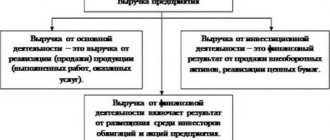It is generally accepted that an individual entrepreneur can spend the money he receives as he wants, and the organization of cash flow is limited. But there is Central Bank Directive No. 5348-U dated December 9, 2019, which actually applies to entrepreneurs too. Have you looked at it lately? So let's see what you can really spend money on without taking it to the bank, and what is strictly prohibited.
Revenue to the cash desk can come from: the sale of goods, provision of services or performance of work. Although many buyers now pay with cards, cash is also in use, even counterparties - the same organizations - send their accountable persons to pay for purchases in cash, and entrepreneurs prefer cash to non-cash payments.
What can you spend the proceeds on directly from the cash register:
- Salary and social benefits - financial assistance, for example. Considering that in small retail outlets (stalls, tents, pavilions) they sometimes issue payment to the seller immediately per day (and even as a percentage of revenue), this is convenient.
- Payment to suppliers, performers for goods, work, services . Moreover, both directly from the cash register and through accountants. In the second case, the money must first be given to the employee, and then an advance report and documents confirming payment must be received from him.
- Returns . There is a small “ambush” here in the Directive. You can only return money in cash for a purchase that was also received in cash, but if the payment was by card, then you need to return the purchase amount to it. This literally follows from the text of the Directions:
“refund of funds for previously paid in cash and returned goods, uncompleted work, unrendered services...”
In this case, the buyer may no longer have the card, close it, lose it, or simply refuse to present it and demand a refund in cash. And the law (and the court, if anything happens) will be on his side.
Here you can understand both sides - the buyer needs to return the funds in a way that is more convenient and faster for him (and receiving money here and now is easier than waiting for a transfer to the bank). And the seller needs to comply with the instructions of the Central Bank and not receive charges for cashing out.
- Payments of insurance compensation under insurance contracts for individuals. This applies more to insurance companies, we will not dwell here. Yes, by the way, there is also a clarification about the initial payment of the insurance premium in cash.
- Cash issuance when conducting transactions by a bank payment agent (subagent).
- And finally, the most long-awaited thing - the issuance of cash for the personal needs of the entrepreneur . Those. An individual entrepreneur can indeed take money from the cash register and use it for himself without restrictions.
There are no restrictions on the amounts for these items, and it does not matter who is involved in the calculations - individual entrepreneurs, organizations or individuals.
Further on the list are loans. Let's take a closer look at them.
Paying salaries in cash is prohibited in 2021
136 of the Labor Code of the Russian Federation, it follows that they are aimed at ensuring the coordination of the interests of the parties to the employment contract when determining the rules for paying wages, and at creating conditions for the unhindered receipt of wages by the employee personally in a way convenient for him.
Thus, Art. 136 of the Labor Code of the Russian Federation guarantees the employee the right to unhindered receipt of wages in a manner convenient for him *(1). In other words, the right to choose the method of receiving wages belongs to the employee. As follows from part three of Art.
Attention Completed and signed documents are handed over to the cashier for execution.
The cashier, having received the statement or cash register, checks the presence of the chief accountant’s or accountant’s signature (if they are absent, the presence of the manager’s signature) and its compliance with the sample, the correspondence of the cash amounts entered in numbers with the amounts entered in words.
The cashier issues cash directly to the recipient indicated in the cash register or statement.
The regulations by which the limit is calculated, with visual formulas, are given in the appendix to Bank of Russia Directive No. 3210-U.
The cash register limit can be revised as many times as you like throughout the year.
There are no prohibitions here. If something changes in your work, you can always adapt to new needs by simply issuing a new balance order with a new - increased - amount.
It all depends on where the division transfers its revenue.
Also, the responsibilities of a cashier can be taken over by the chief accountant or even the director, if the number of employees in the organization is small.
The procedure for conducting cash transactions in the Russian Federation 2021 was approved by the Central Bank's directive No. 3210-U dated 03/11/2014 (with the latest changes made by the instruction No. 4416-U dated 06/19/2019 and entered into force on August 19, 2019). An organization must have a cash limit. This is the allowable amount of cash that can remain in the cash register at the end of the working day.
Exceeding the limit amounts must be deposited at the bank. The organization determines the cash limit independently based on the characteristics of its activities and the volume of cash receipts and withdrawals.
Organizations related to small businesses, as well as individual entrepreneurs, have the right not to set a cash register limit and keep as much cash in the cash register as needed (clause 2 of Directive No. 3210-U). An amount that does not exceed the limit must remain in the organization’s cash register.
In general, those who have a white salary should not worry, but those receiving it in an envelope will have to think about whether, if checked, they will be able to indicate the source of origin of the funds, Magomedov noted.
In addition, from 2021, all real estate transactions with settlements in both cash and non-cash form will be subject to control, if they are carried out for an amount of at least three million rubles. This will affect not only those transactions where ownership rights are transferred (purchase and sale or exchange), but also those where rights are not alienated (for example, rent).
Moreover, not only banks, but also notaries will be required to report real estate transactions to Rosfinmonitoring. By the way, the fiscal authorities have also approved a new control methodology, which, among other things, specifically states the need to pay attention to transactions where the price specified in the contract is clearly lower than the real market value of the property. Also, Rosfinmonitoring may have questions if the buyer of real estate shells out a large sum of cash for it, without having declared sources of income.
Now, formally, for each settlement on real estate transactions, if the amount is more than three million rubles, the bank will request explanations and documents under the agreement, copies will be kept in the client’s file, and a certificate will be sent to Rosfinmonitoring about the presence or absence of signs of dubiousness of the transaction. Such a sign may be its unusual nature or the absence of a clear economic meaning of the contract. For example, if a legal entity purchases a piece of real estate for a large sum that is in no way related to its activities, or if an individual donates real estate to the legal entity, etc.
Cash at gunpoint: how gray income will be sought in 2021
OPs now may not maintain a cash book if they do not store cash and transfer it to the legal entity’s cash desk after each shift.
Before the amendments, all OPs that accepted and issued cash were required to maintain a cash book. If there was no current account, the obligation also remained. For the absence of their books, tax officials fined companies 50 thousand rubles, and managers 5 thousand rubles.
An employee has the right to timely receipt of wages in full (Part 1, Article 21 of the Labor Code of the Russian Federation). Wages are paid to the employee at the place of work or by transfer using the details of an individual’s current account with a credit institution (Article 136 of the Labor Code of the Russian Federation). The conditions for receiving wages are specified in the employment or collective agreement.
An employee can also change the bank at any time to the one in which he wishes to receive wages. To do this, you need to contact your employer with an application (at least 5 working days before the payday).
The Constitutional Court of the Russian Federation, in its Determination No. 769-o dated April 26, 2016, explained that in Part 3 of Art. 136 of the Labor Code of the Russian Federation spells out guarantees for each employee, according to which the implementation of other articles of the Code is possible (Articles 2, 21, 22, 56). The employee can count with full confidence that all his work will be paid, regardless of the employer’s financial problems or other circumstances.
Transferring wages to employees under a salary project undoubtedly provides certain bonuses to the employer from the credit institution. However, the employee also has the right to assert his own rights.
It is worth drawing up an application in the form of a free-form petition addressed to the director of the enterprise, indicating the form of cash payment in which the employee wishes to receive the money earned. The application must refer to Art. 136.
There is no need to demand in the application: after all, the law in this case obliges the employee to negotiate with the employer.
In judicial practice, on claims of dissatisfied employees, judges quite often refuse to receive wages in cash (Decision of the Moscow City Court dated November 12, 2018 in case No. 33-48833/2018, appeal Determination of the Judicial Collegium for Civil Cases of the Kirov Regional Court dated April 25, 2017 to case No. 33-1671/2017, appeal Ruling of the Judicial Collegium for Civil Cases of the Krasnodar Regional Court dated 02/11/2014 in case No. 33-2765/14).
New rules for cash transactions and cash issuance for reporting in 2021
Current as of February 13, 2021
The regulation on how to receive money in cash or on a bank card is in the field of regulations and provisions on the payment of wages in the Russian Federation:
- Article 131 of the Labor Code of the Russian Federation determines the forms of payments;
- Article 136 of the same code establishes the procedure for issuing money by the employer;
- Federal Law 161 of December 10, 2003 regulates the accounting, conduct and procedure of currency transactions.
These are the main documents valid throughout Russia. This issue can be regulated with the help of additionally adopted legal acts that consider the characteristics of the activity, region or industry.
The Russian employer is obliged first of all to study these documents, since the punishment for violations in the field of remuneration is becoming more stringent from year to year.
The employees themselves should do the same in order to better study their own rights and monitor their compliance.
There are no specific restrictions on the issuance of wages in cash to workers of the Russian Federation. Each organization or enterprise establishes a procedure for issuing wages:
- this procedure is recorded in internal labor documents;
- it is necessary to indicate its points in the employee’s employment contract with the administration.
The regulations of the currency legislation of the Russian Federation prohibit non-cash payments (including wages) with citizens of foreign countries or with stateless persons, even if the employment is official and meets absolutely all the requirements of the Labor Code of Russia.
As of July 1, 2018, a ban on the issuance of cash to all employees of state and budgetary enterprises or organizations came into force.
All mutual settlements with this category of employees are carried out exclusively using a bank card and the federal payment system.
The exception is cases when a person does not have the opportunity to receive money by non-cash means. For example, due to religious beliefs that prevent the use of bank cards, or the lack of an option to withdraw cash from an ATM. In such situations, management should worry and provide the employee with the opportunity to receive money in person and not on a card.
There are not many reasons for organizations to withdraw cash. And any cash withdrawal must be documented.
| Cash withdrawal goals | Justification for the Federal Tax Service | Organization documents |
| Purchase of materials, goods, services from individuals | Organization, for the purpose of organizing the production of own goods, purchases materials, raw materials, services, etc. from individuals. | Invoices for transfer and acceptance of goods. Certificate of acceptance of services. |
| Cash issuance on report | The organization gives money to employees for a business trip: buying tickets, paying for housing, paying for transportation, etc. The organization gives employees cash to purchase household goods, etc. | Advance report. Checks. |
| Settlements with partners | The organization pays in cash to partners for the supply of goods, materials, raw materials, etc. The payment method is provided for by the terms of the contract and is economically beneficial. | Agreement. Withdrawal slip. Invoices. |
| Payment of wages to employees | The organization pays wages to employees who refused to receive money on bank cards and wrote a statement asking for their wages to be given in cash. | Expense orders. Payroll. |
| Payment of child benefits | The organization pays child benefits to employees who refused to receive money on bank cards and wrote an application asking for their salaries to be given in cash or did not apply for Mir cards. | Expense orders. |
How can you receive your salary in cash and not on a card?
The order in which wages should be paid to employees is fully prescribed in Russian laws. This, in particular, is evidenced by at least two articles of the Labor Code of the Russian Federation and two separate federal laws.
Let's deal with them in order:
- Article 131 of the Labor Code of the Russian Federation states that wages must be paid either in cash or in kind. However, payment in kind cannot exceed 20% of total earnings. Salaries must be paid exclusively in Russian rubles, unless the employee works abroad permanently or is sent outside Russia on a business trip.
- Article 136 of the Labor Code of the Russian Federation clarifies the procedure for paying wages. In particular, an employee’s work can be paid at the place of work (and this is a cash payment) or by transferring money to the employee’s bank account (most often this is a bank card).
- Federal Law 161 of June 27, 2011 says that state employees, if they receive a salary on a bank card, can only receive it on a bank card of the Mir national system. This does not apply to non-budgetary employees.
- Federal Law 173 of December 10, 2003 regulates foreign exchange transactions and in our case it affects the remuneration of a non-resident of the Russian Federation, that is, a foreigner. This law actually limits the payment of wages in cash in 2021.
The listed norms of law are the basis of legislation regarding methods of paying wages to employees.
In addition to these standards, there are additional regulations that regulate some of the nuances of remuneration due to the special nature of the work, industry or regional characteristics.
For workers who are citizens of Russia, there is no such prohibition in Russian legislation. Payment of wages in cash for Russians in 2021 is not prohibited.
The employee himself has the right to choose in what form he wants to receive his earnings: in cash or by transfer to a bank account (card). Moreover, the employer does not have the right to force an employee to use the services of a particular bank. He is obliged to transfer funds to an account in the credit institution indicated by the employee. The employer may be punished for violating this requirement.
If wages are paid in cash, the procedure for such payments prescribed by law must be followed, including the time of their making, the execution of accounting entries, etc.
Of course, from the point of view of the law, it is prohibited to pay wages in cash or by bank transfer if the earnings are “gray”.
In practice, however, the state, at least for now, turns a blind eye to such facts. The practice of paying wages “in an envelope” is the norm for the private sector of the economy - employers thereby save on social contributions for employees.
23520
22992
129335
Money from the cash register. What to spend it on
The decision on how the company spends the amount of money from the cash desk is made by the bank every year. It annually reviews the purposes for which certain funds are used. The results of calculations and cash desk decisions are displayed on both copies of the document.
It is easiest to spend money for the purposes specified in legislative acts and regulations if you coordinate your actions with the bank in advance. At the same time, there are no exact instructions for what purposes funds from the cash register can be spent.
The seventh paragraph, which describes the order in which cash transactions are carried out, indicates for what purposes cash proceeds can be spent.
- When things are purchased from the population, container products.
- Purchase of agricultural products.
- Social and labor benefits are paid
- Salary.
Your cash business: how not to lose your salary before you receive it
Payment of wages to a non-resident according to currency legislation is also made taking into account the residence of the employee. But in this aspect it is necessary to focus on the provisions of the law on currency regulation of December 10, 2003 No. 173-FZ. Thus, currency residents are Russian citizens and foreign persons permanently residing in the Russian Federation, which is confirmed by a residence permit (Article 1 of Law No. 173-FZ). All other individuals with foreign citizenship are currency non-residents. This sign is important when determining the method of payment of earnings.
In our publication today, we will look at the rules for calculating this tax and find out in which cases taxpayers are entitled to benefits and tax deductions. All income received by an employee is summed up: incentives, bonuses and other additional payments are taken into account. Official expenses are deducted from the total amount. A tax of 13% or 30% is levied on the amount received.
Salary in foreign currency - is this possible in our country? What regulatory documents regulate the receipt of earnings in the currency of a foreign country? The Central Bank of the Russian Federation dated October 7, 2021 No. 3073-U establishes a limit for cash payments between legal entities in 2021. Payments between individuals in cash are not limited.
Nevertheless, the Federal Tax Service continues to insist on violations of currency laws (letter of the Federal Tax Service dated August 29, 2021 No. ZN-4-17/15799) and impose fines for cash payments to foreigners. Therefore, if you do not want to sue, indicate in the employment contract with the foreigner that the payment of wages will be carried out by bank transfer to an account that the employee is required to open.
If wages are paid in cash through the cash register, the following entry is made in accounting: Dt 70 Kt 50. Funds for these purposes can be in the cash register for 5 working days, regardless of the established cash limit. Unpaid wages for this period are deposited (clause 6.5 of instruction No. 3210-U). In accounting, this is reflected by the entry: Dt 70 Kt 76.4. Account 76 has a sub-account “Settlements on deposited amounts”, which is used in such cases.
What to do if there are no receipts
You must indicate cash in the amount that was issued in 2021, or the expected amount of profit and expenses. Various employee benefits are excluded from this scheme.
L=R/P *Nn
Nn – is a time period, measured in days, between which legal entities receive cash on the basis of a check. Should not be more than one week. Or two working days if the company is located in an area where there are no bank branches. It is separately determined if there is a case of force majeure.
P – is a settlement period determined independently by those who have the status of a legal entity. This is the time during which it is necessary to take into account the amount of cash received. The maximum period in working days is 92. It is necessary to take into account how funds moved and worked over the same period, but in previous years, the time when the issuance was peak.
L - the limit itself in rubles
Does an employee have the right to demand payment of wages in cash and not on a card?
- Current account of the organization. An authorized employee, for example a director or accountant, can withdraw funds from the company's current account in advance to ensure payment of wages, which must be reflected in the withdrawal receipt.
- Cash received by the organization's cash desk. It is not prohibited to use the cash available in the company's cash register to pay salaries, subject to one limitation. Thus, it is not allowed to issue as salary cash transferred for the performance of intermediary services - the purchase of goods, transfer to third parties, payment for the services of mobile operators or repayment of debt to third parties.
A bank salary card is a tool for receiving cash payments from an employer. The company significantly reduces its costs when paying wages to employees in non-cash form. But salary cards have a number of advantages for holders:
- Free service (if simple conditions are met).
- Additional income due to interest accrual on the balance.
- Refund of part of the cost of purchases under cashback programs.
- Preferential lending conditions in some banks when connecting an individual salary project.
Directly in the standards of Russian legislation there are no restrictions on the payment to citizens of the Russian Federation of their wages in cash. Thus, the employer establishes the general procedure for paying wages in the internal documents of the organization, and also necessarily reflects this fact in the employment contract with the employee - wages can be paid either in cash or by crediting funds to the employee’s bank account.
At the same time, if the employer ensures payment of wages in cash in 2021, he must also follow a certain procedure - certain restrictions are imposed on the source of funds, the time of settlements with the employee and the procedure for processing accounting entries and cash orders during the issuance of wages.
The right to choose a bank for paying wages appeared thanks to the Law of November 4, 2014 No. 333-FZ, which supplemented Part 3 of Art. 136 of the Labor Code of the Russian Federation, the employer is obliged to pay wages to the employee to the credit institution specified in his application. The conditions for payment of wages must be established by a collective or labor agreement. In addition, the employee has the right to change the credit institution by notifying the employer in writing in advance about the change in the details for transferring wages no later than 5 working days before the payday.
Pros of salary from revenue
- Personnel are interested in revenue growth;
- The staff becomes more proactive and responsible. An understanding of the common cause comes. Everyone becomes interested in the success of the enterprise;
- “Freeloaders and parasites” and pessimists are eliminated. The team gets healthier, the truly responsible employees remain;
- When properly developed and explained, costs are transparent for the owner and understanding on the part of the employee;
- Reduce wage costs when results are poor.
Sign up for a consultation







